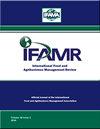农业非关税措施的经济和环境影响:基于从价等效估计的证据
IF 1.5
4区 经济学
Q3 AGRICULTURAL ECONOMICS & POLICY
International Food and Agribusiness Management Review
Pub Date : 2023-05-21
DOI:10.22434/ifamr2022.0094
引用次数: 0
摘要
非关税措施作为农产品贸易的隐性壁垒,不仅会由于农业价值链上活动的国际转移而导致生产和福利扭曲,而且还会对农业食品系统碳排放的规模和分布产生后续影响。本文结合2001-2019年详细的双边贸易数据,利用重力模型估算了非关税措施的从价等价物,并将估算结果纳入全球贸易分析项目模型和Eora26的多区域投入产出表,量化了非关税措施的经济和环境影响。我们表明,虽然所有类型的非关税措施的关税等价物平均为正,但各国和产品之间存在很大的异质性。这些措施造成的额外贸易壁垒将增加大多数农业进口国国内与农业有关部门的规模,反之亦然。同时,它们将使全球福利平均减少1600万美元,特别是非关税措施的主要征收国和目标市场的福利。全球农业食品系统的碳排放量倾向于增加约1%,特别是由于发达国家较大的食品加工业。我们的论文证实,非关税措施导致了农业食品系统中的福利扭曲和碳排放。因此,迫切需要进一步推动农业贸易体制改革和各国之间的政策协调,以促进农业粮食体系转型,使其更具一体化和可持续性。本文章由计算机程序翻译,如有差异,请以英文原文为准。
Economic and environmental impacts of agricultural non-tariff measures: evidence based on ad valorem equivalent estimates
Non-tariff measures as hidden barriers to agricultural trade would not only result in production and welfare distortions due to the international relocation of activities along the agricultural value chain, but also yield subsequent consequences to both the scale and distribution of carbon emissions from the agri-food system. This paper estimates ad valorem equivalents of non-tariff measures using a gravity model in combination with detailed bilateral trade data of 2001-2019, and incorporates the estimations in the Global Trade Analysis Project model and a multi-regional input-output table of Eora26 to quantify economic and environmental impacts of non-tariff measures. We show that while tariff equivalents are on average positive for all types of non-tariff measures, there are substantial heterogeneities across countries and products. The extra trade barriers imposed by these measures would increase the scale of domestic agriculture-related sectors for most agriculture importing countries, and vice versa for major exporters. Meanwhile, they would reduce the global welfare at amount of 16 millions US dollars on average and in particular, the welfare of key imposers and targeting markets of non-tariff measures. Carbon emissions from the agri-food system tend to increase about 1% around the world, especially due to the larger food processing industry in developed countries. Our paper confirms that non-tariff measures lead to both welfare distortions and carbon emissions in the agri-food system. It thus calls for urgent needs to promote further reforms of the agricultural trade regime and the policy coordination across countries to facilitate agri-food system transformation with more integration and sustainability.
求助全文
通过发布文献求助,成功后即可免费获取论文全文。
去求助
来源期刊

International Food and Agribusiness Management Review
AGRICULTURAL ECONOMICS & POLICY-
CiteScore
2.90
自引率
0.00%
发文量
0
审稿时长
>12 weeks
期刊介绍:
The IFAMR is an internationally recognized catalyst for discussion and inquiry on issues related to the global food and agribusiness system. The journal provides an intellectual meeting place for industry executives, managers, scholars and practitioners interested in the effective management of agribusiness firms and organizations.
IFAMR publishes high quality, peer reviewed, scholarly articles on topics related to the practice of management in the food and agribusiness industry. The Journal provides managers, researchers and teachers a forum where they can publish and acquire research results, new ideas, applications of new knowledge, and discussions of issues important to the worldwide food and agribusiness system. The Review is published electronically on this website.
The core values of the Review are as follows: excellent academic contributions; fast, thorough, and detailed peer reviews; building human capital through the development of good writing skills in scholars and students; broad international representation among authors, editors, and reviewers; a showcase for IFAMA’s unique industry-scholar relationship, and a facilitator of international debate, networking, and research in agribusiness.
The Review welcomes scholarly articles on business, public policy, law and education pertaining to the global food system. Articles may be applied or theoretical, but must relevant to managers or management scholars studies, industry interviews, and book reviews are also welcome.
 求助内容:
求助内容: 应助结果提醒方式:
应助结果提醒方式:


